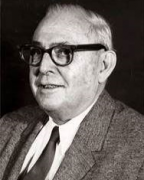Awards
- Honorary Degree - 1954
- LL.D.
- Doctor of Laws
- Ernie Pyle Hall Dedication
- Bloomington, Indiana
- Presenter: Herman B Wells

Basil L. Walters, one of America's leading newspapermen of his time, was born a Hoosier in 1896. His nickname, "Stuffy," was dubbed him in his childhood because his baseball style reminded hometown Frankfort folks of Stuffy McInnis, the star first baseman of the old Philadelphia Athletics. The nickname caught on and throughout his lifetime, he was known simply as "Stuffy" Walters.
Following his career as a newspaper carrier, Walters entered Indiana University in 1914 where he got his first newspaper experience as editor of the Indiana Daily Student. He also took a job as a reporter for the Richmond Palladium in 1915.
"Stuffy" left school in 1917 to enter the Army as a member of the University's famed Ambulance Corps. Shortly after, however, he was made editor of the U.S. Army newspaper in Camp Grove and later in Milan, Italy.
Once out of the Army, Walters joined the staff of the Indianapolis Star as telegraph editor. Although his career with the Star lasted only one year, Editor Jim Stuart considered him "the best telegraph editor we ever had."
In 1921, Walters took the same position with the Milwaukee Journal. Seven years later, he joined the staff of the Des Moines Register and Tribune as assistant managing editor and later became managing editor.
In 1941, Walters became executive editor of the Minneapolis Star, Journal and Tribune. The Star was then running third in a three-paper city, but in a few short years "Stuffy" managed to put it in the number one spot.
News of his work must have spread, because in 1944 Walters was asked to help the ailing Chicago Daily News. During his career as executive editor and director of Knights Newspapers and vice president of the Chicago Daily News, the latter increased in circulation by 40 percent, the highest circulation in the paper's history at that time. It also won five Pulitzer Prizes and "virtually every other honor granted American newspapers."
In 1959, Walters was named editor of the Chicago Daily News. In announcing his appointment, Marshall Field, Jr. said, "Mr. Walters has had a great part in building the great tradition of the Daily News service to Chicago and the Middle West. For its notable readability, enterprise and vigor, he deserves much personal credit. His appointment as editor will guarantee that the Daily News will continue to progress in the same direction that it has been going."
After only two years as editor, "Stuffy" retired and returned to his 40-acre home in Frankfort to start a newspaper consulting business. The firm, Newspaper Research Association, limited its clientele to four and included "sizeable" newspapers throughout the country. Indeed, one of his clients was former employer, Marshall Field, Jr.
Basil "Stuffy" Walters died in 1975 at the age of 79. He was survived by his wife of 52 years, Reah Elizabeth (Handy), and three children: Nancy, Tom, and James.
Journalistic Contributions:
Basil "Stuffy" Walters was considered by his peers a pioneer in modernizing news, design, and content. He also believed in concise and to-the-point news reporting. He is remembered as teaching his reporters, "Tell your story, period. Don't write it." He was considered the champion of the short sentence.
Not only was "Stuffy" considered one of America's foremost newspapermen, but he was also considered a man with color and personality. One reporter said of him, "He was a friend of newspapermen from cubs to publishers the country over."
Indeed, these three attributes helped make him one of the nation's top editors.
Walters' most notable contribution to journalism, however, was his belief in the freedom of the press and the individuality of each newspaper. He so believed in these ideals that he dedicated many years to them.
He was the first chairman of the Freedom of Information Committee of American Society of Newspaper Editors, (president in 1953-54); a member of the Executive Committee of Associated Press, Managing Editors Association, (president 1941-43); a member of the Allied Newspaper Council; director of the American Society of Newspaper Editors, (1953-54); and president of the Newspaper Research Foundation, (1961).
At the end of his term as president of the American Society of Newspaper Editors, Walters said, "I am more than ever convinced that the strength of the American press lies in the individual newspaper rather than in our newspaper organizations.
"There must never be in America a central press authority, either private or governmental. Every newspaper in this land of ours should have its own individuality. While our newspapers are the best in the world and the best of all times, there is still too much similarity in our products.
"If we, the editors, ever become collectivists in our thinking instead of free and independent individualists, then indeed America will be in grave danger."
In 1956, his dedication to these beliefs was recognized when he was presented the coveted John Peter Zenger Award.
Other notable awards include an honorary LL.D. degree from Indiana University upon the dedication of Ernie Pyle Hall in 1954, Indiana Newspaperman of the year in 1959, and the First M. Lyle Spencer Visiting Professor of Journalism, Syracuse University.